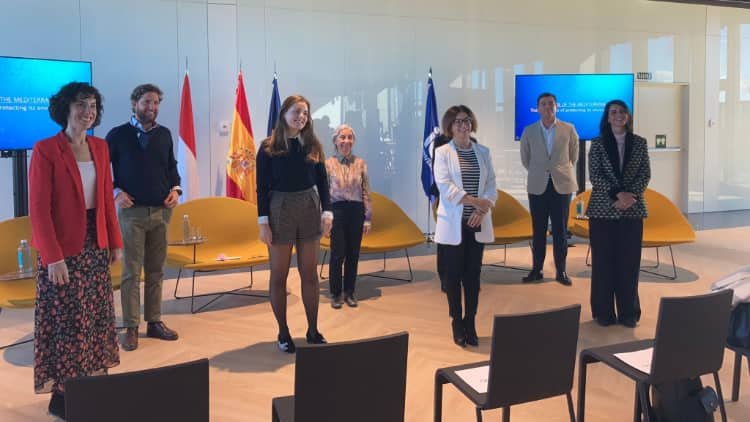Marta Martínez
Cooperating to protect the environment is crucial for the future of the Mediterranean, according to a conference on the climate crisis in the region organised by the Embassy of Monaco in Spain and IE University on Friday.
During the event, the President of IE University, Santiago Iñiguez de Onzoño, pointed out that the measures, agreements and pacts made between States are not up to the challenge of finding a solution to the climate crisis facing the world.
For her part, the Ambassador of Monaco, Catherine Fautrier-Rousseau, took a more optimistic approach, advocating education, both for adults and children, in order to achieve a tangible change in the crisis.
Both agreed on the need to target children and young people, whose innovative ideas and entrepreneurial behaviour they believe can contribute greatly to the fight against climate change.
Just as society has started to hear about the green economy since it became aware of climate change, the Deputy Secretary General of the Union for the Mediterranean (UfM), Isidro González Afonso, indicated that this organisation developed the concept of the blue economy, in which he highlighted Monaco as a leading country.
González Afonso explained that the blue economy is the economy of the seas, which aims at the environmental and responsible development of tourism, shipping and fishing, among other factors. Some experts, he said, consider it to be the seventh largest economy in the world, because 71% of the Earth’s surface area is covered by water.
He added that, of this percentage, the Mediterranean Sea represents 1%, despite which, a third of all ships sailing on Earth pass through the Mare Nostrum, irremediably polluting its enclosed waters, resulting in the disastrous consequence that the Mediterranean maritime region is the second most affected by climate change in the world, surpassed only by the seas of the Arctic.
In this sense, as Lucile Courtial, secretary general of BeMED (Beyond Plastic Med), an organisation that fights plastic pollution in the Mediterranean Sea, explained, the Mediterranean Sea cannot be compared to an ocean, open and full of currents and tides; it is a closed sea and, as a consequence, the plastic-based pollution that penetrates its waters remains there for years until it is eliminated, causing, along the way, destruction to both the fauna and the flora of the Mare Nostrum.
During the conference, the possibility that by 2050 there will be more plastic than fish in the Mediterranean was pointed out, and solutions and actions that have improved or can improve the environmental situation of the Mediterranean were also analysed.
Thus, the president of MedPAN (Marine Protected Areas Network in the Mediterranean), Purificación Canals, spoke of these protected areas, characterised by natural values and protection to ensure the continuation of these values.
She explained that the Convention on Biological Diversity established the objective that by 2020, 10% of the earth’s aquatic surface should be protected areas. By 2021, 8.3% of the earth’s aquatic areas were to be protected, and these areas had sufficient budget, professionals and resources at their disposal to ensure their maintenance.
She added that the goal had also been set for 30% of the planet’s seas to be protected by 2030, although she acknowledged that this was an unquestionably impossible goal to achieve in a decade. However, he considered it necessary, in order to get as close as possible to this objective, to obtain political support and to improve the capacities of the dedicated administrations.
Isidro González Afonso also indicated that such is the seriousness of the issue that political differences have been overcome in order to reach an effective agreement on the matter. He cited that the Union for the Mediterranean, which coordinates the action of 42 countries, including Israel and Palestine, managed, after two years of negotiations, to draw up a ministerial declaration, an agenda that covers renewable energies as well as sustainable tourism, respect for the environment and the desire to reduce polluting fuels from ships passing through the Mediterranean.
Bernard Fautrier, environmental advisor to Prince Albert II of Monaco, insisted that the Mediterranean Sea is fundamental to the European economy, since it is directly related to energy, trade and the security of the countries that surround it.
Therefore, he pointed out the importance of everyone collaborating with direct action, such as MedPAN or BeMED, or by emotionally involving citizens, who, as Luis Prieto (founder of MadBLUE) and artist Pepe Monserrate pointed out, are, after all, the ones who have the control to stop their own actions together.
Fautrier stressed that progress, development and balance are not possible in a damaged environment, and affirmed that the Mediterranean is the Mare Nostrum, and as our sea, it must be protected in the best possible way as what it is, part of a home.






